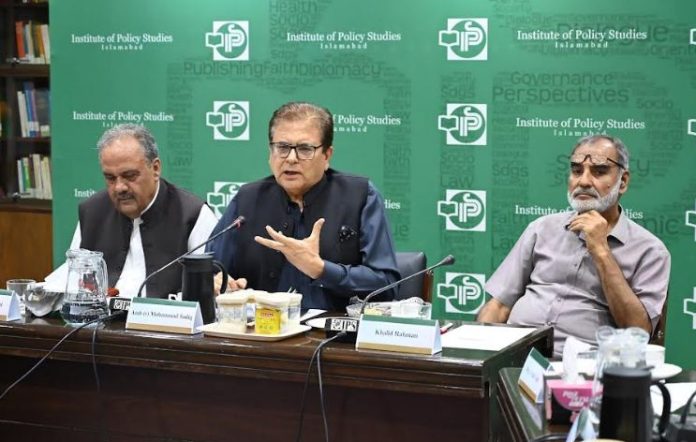ISLAMABAD, AUG 10 /DNA/ – Upholding the rule of law through a balanced approach by both sides is crucial for restructuring Pak-Afghan relations in the post-August 2021 context, given the internal complexities and external influences shaping their bilateral relationship.
This principle must be bilaterally applied at the policy level, in border management, and throughout all interactions, coupled with mutual recognition of each other’s sovereignty and an understanding of diverse perspectives. Such mutual efforts are crucial for fostering regional stability and building trust.
The views were reflected during a discussion followed by the keynote speech of Ambassador Asif Durrani, Pakistan’s special representative on Afghanistan, in a session titled “Trajectory of Pakistan-Afghanistan Relations: Post-August 2021” organized by the Institute of Policy Studies (IPS), Islamabad, in collaboration with the Institute of Regional Studies (IRS), Peshawar.
The session, chaired by Ambassador (r) Mohammad Sadiq, Pakistan’s former special representative on Afghanistan, was addressed by Khalid Rahman, chairman IPS, Dr Muhammad Iqbal Khalil, chairman IRS, Farhatullah Babar, former senator, Dr. Khuram Iqbal, HoD International Relations, National Defence University, Ambassador (r) Ayaz Wazir, Brigadier (r) Said Nazir, defense analyst, Noorulain Naseem, policy advisor, GIZ Pakistan, and other panelists.
The session emphasized several key perspectives and offered recommendations for fostering a more stable and constructive bilateral relationship.
The gathering underscored the importance of managing bilateral relationships through a pragmatic and deferential approach by both countries, while remaining mindful of the challenges that persist on both sides of the border. This involves mutual recognition of each other’s sovereignty and an understanding of the diverse perspectives. Moving beyond stereotypical views in policymaking, coupled with effective media management, is crucial for reshaping perceptions and fostering a reimagined bilateral relationship at both governmental and public levels.
It was highlighted that Pak-Afghan bilateral policy approaches need to be shifted towards a more inclusive framework. This includes addressing the trust deficit, particularly in areas such as refugee policies, by developing a deeper understanding of the leadership mindsets in both countries and incorporating this understanding into policy formulations. A restructured approach that leverages institutional knowledge and normalizes discourse on bilateral issues is essential for long-term stability.
Additionally, the discussion emphasized the need for internal stability in both countries. Shifting from a military-centric to a human-centric development approach, particularly in border areas, was advocated as a means of enhancing inner strength and maintaining security more effectively, aligning with broader strategic objectives.
The discussion underscored that external factors also play a significant role in shaping the dynamics of Pak-Afghan relations. Therefore, a managed engagement is essential, taking into account the internal complexities within both nations as well as the external influences that impact the development of a stable and constructive bilateral relationship.
In conclusion, Khalid Rahman stressed the importance of self-assessment in the policy areas of both countries. He noted that while improvements are necessary, it is equally important to recognize the complexity introduced by geopolitical shifts in regional dynamics. Fostering effective dialogue and gaining a comprehensive understanding of these complexities are crucial for advancing Pak-Afghan relations in a rapidly changing geopolitical landscape and in the post-truth era.











